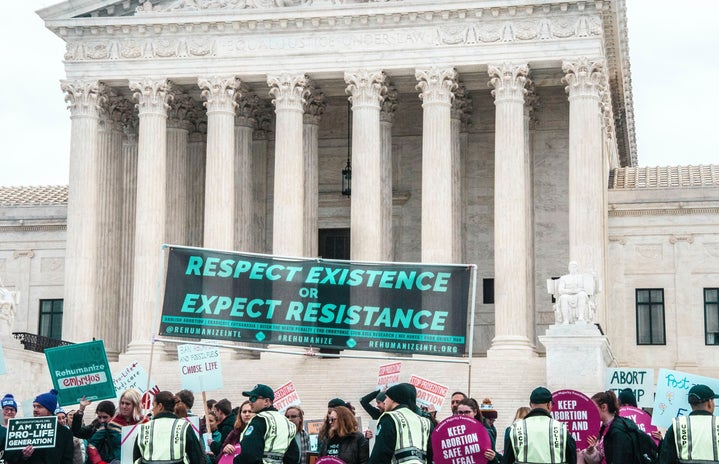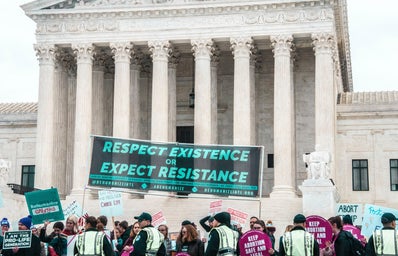“Women’s heart are lethal weapons. Did you hold mine and feel threatened?” ~ Maisie Peters, “History of Man”
On February 16, 2024, the Alabama Supreme Court ruled that frozen embryos are considered to be children. In other words, Alabama ruled that embryos are “extrauterine children,” which poses an extreme threat to IVF in the near future.
For those who are unfamiliar with the term, in vitro fertilization (IVF) is a type of assisted reproductive technology (ART) that aids in a woman getting pregnant, especially when they have fertility issues or genetic problems. During the process itself, eggs are collected from the ovaries and fertilized by sperm in a lab setting, resulting in an embryo. Then, a procedure is done to place one or more of the embryos into the women’s uterus. This is a crucial development in women’s health, because IVF is the main treatment for those who have fallopian tube damage, ovulation disorders, endometriosis, unexplained infertility, genetic disorders, and so many more reproductive issues.
Coming back to the ruling, the decision itself came to light by couples who had their frozen embryos accidentally destroyed. To many, this ruling does not come as a surprise, especially as a result of the many harmful precedents that were set forth with Dobbs v. Jackson Women’s Health Organization – the case that overturned Roe v. Wade in June 2022. The overturning of Roe v. Wade is undoubtedly the most controversial court case for generations to come. Not only did it violate the principle of stare decisis (a legal doctrine that states that courts should follow legal precedents), but it establishes a very scary reality for many minorities and people of color. This ripple effect can be best explained by Michelle Bachelet, the previous UN High Commissioner for Human Rights. She emphasized the importance of human rights safeguards for individuals seeking or offering abortions. In particular, she underscored the significant ramifications this decision would carry for the basic rights of millions in the United States, notably those from low-income backgrounds and marginalized racial and ethnic communities.
They didn’t say in vitro fertilization is illegal, and they didn’t say that you can’t freeze embryos. It’s even worse – there is no road map.
Barbara Collura, President and Chief Executive of Resolve
Doctors and healthcare providers both within Alabama and outside are apprehensive regarding the national implications this court case has set forth, especially in states that have banned abortion after the 2022 ruling. Dr. Jason Griffith, a reproductive endocrinologist said the Alabama ruling could “substantially restrict access to a very vital fertility treatment that has helped countless folks today expand their families,” In fact, around 2% of pregnancies in the United States are a result of IVF.
Many reproductive scientists and researchers have already made clear that this ruling is a “medically and scientifically unfounded decision.” Within its many flaws, perhaps the biggest flaw this recent decision holds lies in the uncertainty of what it actually means and entails for the future. It sets a blind rule that a human life starts at the embryo, but does not consider future implications. In other words, it succeeds in its blissful ignorance regarding IVF patients, families that are currently going through the process, and future women who’s only chance of having a child lies in this scientific endeavor.
The court held that a fertilized frozen egg in a fertility clinic freezer should be treated as the legal equivalent of an existent child or a fetus gestating in a womb.
Dr. Paula Amato, President of the American Society for Reproductive Medicine
Dr. Amato anticipated that young physicians would cease to pursue training or practicing medicine in Alabama following the ruling. He also foresaw fertility clinics shutting down in the state if operating them posed the threat of legal repercussions. Couples undergoing arduous and expensive infertility treatments in Alabama expressed being inundated with worries and uncertainties, with some voicing fears that their healthcare providers might be compelled to shutter their clinics.
For instance, Gabrielle Goidel began her medication regimen to ready her body for egg retrieval on Friday, coinciding with the state supreme court’s decision regarding “extrauterine children”. Upon learning of the ruling, she promptly texted her family, expressing her outrage. “I think my exact words were: ‘I want to scream, I want to make a video, I want to message all my representatives and tell them that I’m a real person and this is a decision that affects me.’ I feel like they were making this as for some hypothetical embryos and hypothetical families, and they didn’t really see the consequences.” Currently, Gabrielle and her husband Spencer are proceeding with the IVF process. However, they are uncertain whether they would opt to store their embryos in Alabama. They no longer feel completely committed to residing in the state.
“I never ever imagined that IVF would be questioned,” Goidel said. “I figured that IVF would be seen as starting a family.”


